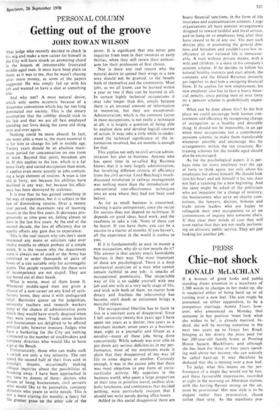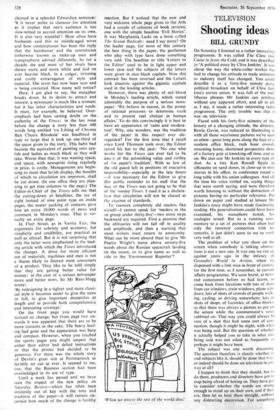PRESS
Chic—not shock
DONALD McLACHLAN
If a woman of good looks and publio standing draws attention in a manifesto of 1,200 words to changes in her make-up, she is suspected either of being hard up or of turning over a new leaf. The aim might be presumed, on either supposition, to be a prosperous marriage. Auntie Times, how- ever, who announced on Monday that someone in her position 'must look what she wishes to be', is already married. In- deed, she will be moving sometime in the next two years up to Grays Inn Road, bringing as her dowry the price paid for her 200-year-old family home at Printing House Square, Blackfriars; and although she has been for three or four years spend- ing well above her income,-she can scarcely be called hard-up. It may therefore be deduced that she is turning over a new leaf.
To judge what this means on the per- formance of a single day would not be fair, and these favourable impressions, recorded at eight in the morning on Aberdeen station, with the herring flavour strong on the air, must be provisional. Her new style is to be elegant rather than provocative, chaste rather than sexy. As the manifesto pro- claimed in a splendid Edwardian sentence: it is never polite to clamour for attention
as it implies that one's audience is too slow-witted to accord attention on its own. It is also very wasteful'! How often have husbands said this to middle-aged wives and how contemptuous has been the reply that the hairdresser and the cosmetician (otherwise known as make-up men and typographers) advised differently. So for a decade she and most of her rivals have shown more and more white and laid on ever heavier black, in a .vulgar, irritating and costly extravagance of style and material. The error has now been seen and is being corrected. How many will notice?
Here, I am glad to say, the metaphor breaks down. In its desire to attract and interest, a newspaper is much like a woman; but it has other characteristics and needs. It niust, for example, be believed. Over- emphasis had been casting doubt on the , authority of the Times: in the last issue before the change a story less than 400 words long entitled `tis Lifting of Chrome Ban Cheers Rhodesia' was headlined in type so large that it took up one-third of . the space given to the story. This habit had become the equivalent of painting onto eye- lids and lashes as much black as they will take. Worse than that, it was wasting space; and space, with newsprint rising regularly in price, is costly. Managements are begin- ning to insist that lavish display, the benefits of which to circulation are unproven, shall be cut down. (In one office they are plan- ning to get nine columns to the page.) The Editor-in-Chief of the Times tells me that the cutting-down of headlines, the use of eight instead of nine point type on inside pages, the neater packing of contents gave him an extra 10,000 words of news and comment in Monday's issue. That is vir- tually an extra page.
In Fleet Street, as in Vanity Fair, the arguments for sobriety and economy, for simplicity and credibility, are practical as well as ethical. But it is not surprising that only the latter were emphasised in the lead- ing article with which the Times introduced the changes. A drive for more efficient use of materials, machines and men is not a theme likely to interest most consumers of a product. They like to be told simply that they are getting better value for money: in the case of a serious newspaper more and better news. So Mr Rees-Mogg wrote: By redesigning in a tighter and more classi- cal style it becomes easier to give the news in full, to give important despatches at length and to provide both comprehensive and interesting coverage.'
On the front page you would have noticed no change; but from page two on- wards it was apparent that there are to be more currants in the cake. Tile heavy lead- ing had gone and the appearance was busy and compact. However, when you reached the sports -pages you might suspect that either their editor had defied instructions or that the printer had decided to be generous. For there was the whole story. of Devlin's great win at Portmarnock as lavishly set out as ever. It seemed to me, too, that the Business section had been overindulged in its use of type.
Until a week has passed and we have seen the impact of the new policy on Saturday Review—which has often been stridently out of key with the tone and tradition of the paper—it will remain un- certain how much of the change is healthy reaction. But I noticed that the new and very welcome whole page given to the Arts had a couple of columns of book reviews, one with the simple headline 'Evil Stories'. It was Marghanita Laski on a book called The Sexual Radicals: need I say more? On the leader page, for most of this century the best thing in the paper, the gentlemen who play with type have done something very odd. The headline or title 'Letters to the Editor' used to be in light upper and lower case and the subjects of the letters were given in nice black capitals. Now this contrast has been reversed and the Letters look anaemic against the gigantic capitals used in the leading articles.
However, there was plenty of red blood in Monday's leading article, which stated admirably the purpose of a serious news- paper. 'We believe in reason, in the power of rational processes to determine truth and to present real choices in human affairs.' To do this convincingly it is best to have an appearance of 'calm and modera- tion'. Why, one wonders, was the tradition of the paper in this respect ever dis- regarded? For the first time that I recall since Lord Thomson took over, the .Editor raised his hat to the past : `No one who works for the Times can ever fail to be aware of the astonishing value and virility of the paper's tradition'. With so few of the old guard left in positions of executive responsibility—especially in the late hours —it was necessary for the Editor to give this public reminder to his staff that the way of the Times was not going to be that of the Sunday Times. I read it as a declara- tion that circulation will not be chased at the expense of standards.
To reassure completely old readers like myself—I cannot speak for 'readers in the AB group under thirty-five'—two more steps backward are required. First a promise that the obituaries will not fall off in quality and amplitude, and then a warning that most writers must return to anonymity. What can be more absurd than to give Mr Pearce Wright's name above seventy-five words about the Russian spacecraft landing on the moon, or to give name as well as title to the 'Environment Reporter'?
When we sneeze the rest of the world



































 Previous page
Previous page